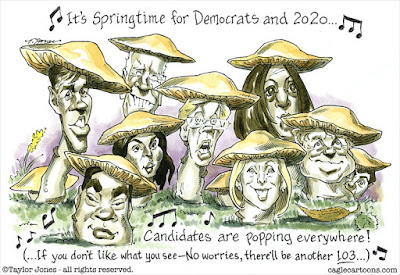If there is one thing Americans generally hold in common it is a belief in fairness. To be specific - fairness of opportunity, not outcome.
Lincoln spoke of it in the context of "the race of life". Everyone should have a shot at making the best of themselves using their natural talents and opportunities.
So how fair is America? Are there any objective measures that can help answer this question? I'd like to suggest there might be two:
Income & wealth distribution.
The
Gini Coefficient is an economic indicator of how wealth is distributed. In a country where everyone had the same income, the Gini Coefficient would be zero; in one where one person had all the cash, the Gini Coefficient would be 1. Where does America stand and where is it heading? Here's the data since World War II (
Wikipedia):
America leads the pack in terms of income disparity in developed countries. Here's a more detailed view of just America. The 1991 bump is an artifact but the trend is clearly up.
The upward trend since the 1980's indicates the wealthiest are capturing an increasingly larger share of the pie. This has been exacerbated by the
Great Recession (Congressional Budget Office).
The net result is that the middle class has been shrinking since the 1960's with a recent pause during the recovery from the Great Recession.
The bottom line is income and wealth inequality is growing in America. Perhaps this inequality could be discounted as evidence of unfairness if the poorest Americans still had the essentials of life and everyone had fair shot of making it to the top. But that doesn't seem to be the case anymore...
Social mobility
Part of the American Dream is to be able to hope your children will be better off than you were. In economic jargon this is "intergenerational mobility". If you are able to improve your lot significantly in your lifetime, this is "intragenerational mobility". How are we doing? Relative to other developed countries, there's less social mobility in America in absolute numbers. Intergenerational elasticity is a fancy way of saying you'll stay pretty much where you started.
So globally we're right behind class-ridden Britain in terms of social mobility. The good news however is that while social mobility isn't high in America, the differences in social mobility between the rich and the poor were narrowing and it was starting to look like at least there was nearly an equal chance for the rich to become poor as the poor to become rich....
Unfortunately, since 2010, this trend seems to have stalled. Here's a recent map of intragenerational mobility in the US (NY Times):
In large population centers on the east and west coasts and much of the Deep South, it's getting tougher to move up from the bottom to a higher rung on the economic ladder.
Putting it all together...
When you have a look at both income / wealth inequality and social mobility, you get the following picture of where America stands in the world:
We accept a higher level of wealth inequality and social immobility than most other developed countries, sustained by the American Dream that we can individually beat the odds. It's becoming clear to many Americans that this isn't working.
So - what to do? Both parties are attacking inequality:
- The Democrats are going after the wealthy. Led by Rep. Alexandria Ocasio-Cortez and Sen. Elizabeth Warren, they're proposing 70% to 90% income taxes and steep wealth transfer taxes. While the objective is to reduce inequality, past experience with very high tax rates suggests that the wealthy will be able to evade them and this will have marginal effect.
- The Republicans are working the bottom end of the income distribution. By reducing red-tape, encouraging the return of American industry and implementing tariffs, the Trump administration is attempting to improve the fortunes of lower middle class Americans employed in natural resource, agriculture or manufacturing.
Neither party is really dealing with the issue of declining social mobility. Each is hostage to oligarchical special interest groups who have a vested interest in keeping themselves where they are and others in their place beneath them.
Dealing with social mobility issues would involve tackling things like:
- Taxing capital gains like income.
- Cutting down monopolies and ensuring real competition in all industries.
- Ensuring adequate public school education for all, regardless of where you live.
- Reducing or removing occupational licensing designed to keep people from entering many occupations.
- Ensuring everyone has access to decent, affordable health care - especially young children.
- Re-writing building codes and zoning regulations.
- Providing mass transit and repairing crumbling infrastructure.
- Reducing red-tape created by special interests to restrict competition.
If you can't move up the economic ladder and see no way for your kids to do better than you did, the American Dream is dead. There are signs of this across the country in boarded up factories, abandoned farms, declining communities, broken families and lives lost to drugs & despair.
There isn't much talk about fairness in our current political climate but it's at the heart of what America is all about. Maybe it's time it became an issue.
-- Mike Power
THE ALLIANCE PARTY - A FAIR DEAL FOR ALL AMERICANS




















